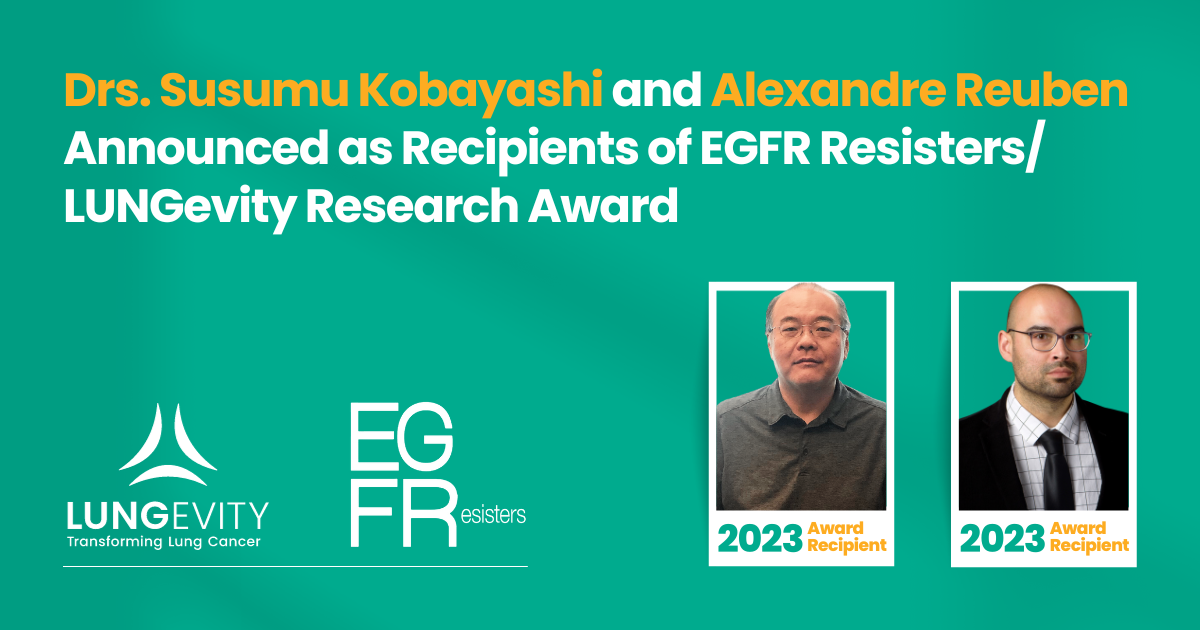LUNGevity Foundation is thrilled to announce the recipients of the EGFR Resisters/LUNGevity Research Award for EGFR-Positive Lung Cancer.
EGFR Resisters, a vibrant patient-led community advocating for improved treatment options for patients with EGFR-positive lung cancer, has partnered with LUNGevity for the second time to support high-impact research focused on EGFR-positive lung cancer.
“We are pleased to partner with LUNGevity again on patient-directed research to address the unmet needs of the EGFR-positive lung cancer community,” said Kristen Kimball, patient advocate with the EGFR Resisters. “This research focuses on a dreaded challenge that many patients will face during their treatment journey—drug resistance.”
This collaboration aims to fund research with the potential to transform the outcomes for patients diagnosed with EGFR-positive lung cancer by ultimately changing EGFR-positive lung cancer into a chronic or curable condition.
“Targeted therapies, such as osimertinib – an EGFR tyrosine kinase inhibitor (TKI) – have provided impressive results in many patients. However, these treatments inevitably leave behind a few cancer cells, called drug-persistent tumor cells, or DPTCs. These are the cells that eventually grow into tumors that are resistant to the TKI,” explains Upal Basu Roy, PhD, MPH, executive director of research at LUNGevity Foundation. “The two projects selected this year aim to address drug resistance using unique approaches – an immunotherapy modality that uses engineered immune cells and an antibody-drug conjugate that targets a protein called CD74 found on EGFR-positive lung cancer cells.”
The recipients of the 2023 EGFR Resisters/LUNGevity Research Award for EGFR-Positive Lung Cancer are:
Susumu Kobayashi, MD, PhD
Beth Israel Deaconess Medical Center
Targeting CD74 to Overcome Resistance to EGFR Inhibitors in Lung Cancer
Dr. Kobayashi and his team recently identified CD74, a novel gene that plays a critical role in the development of DPTCs. In vitro and in vivo experiments demonstrated that increased levels of CD74 block the death of the tumor cell despite being treated with a TKI and allow tumor growth. The researchers hypothesize that eliminating CD74-positive cells by CD74-antibody-drug conjugates (ADCs) may block the emergence of DTPCs, which are responsible for the cancer coming back. If successful, this preclinical work in cell culture systems and animal models will offer a novel approach to eliminate drug resistance in patients with EGFR-positive lung cancer treated with TKIs.
Alexandre Reuben, PhD
University of Texas M.D. Anderson Cancer Center
Eliminating Drug-Tolerant Persister Cells Through T-cell Engineering
In previous studies, Dr. Reuben and his team have identified several antigens, or protein fragments on the cell surface, that are unique to DTPCs following treatment with EGFR TKIs. The team followed up on this work by developing a library of receptors that can be engineered into immune cells to allow the immune cells to recognize and destroy tumor cells that remain after TKI treatment. If successful, this work lays the foundation for using a new approach to block DTPCs and possibly prevent the development of drug resistance in the majority of patients who are living with EGFR-positive lung cancer.
About EGFR Resisters
EGFR Resisters is a grassroots community of over 4,800 patients and caregivers impacted by EGFR-positive lung cancer from 90+ countries, dedicated exclusively to improving outcomes for people with EGFR-positive lung cancer by changing EGFR-positive lung cancer into a manageable, chronic disease. The group uses the strength of its collaborations to drive important research questions and fund novel research and clinical trials. For more information about the EGFR Resisters, please visit www.egfrcancer.org

